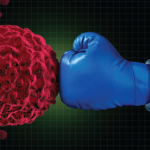(Reuters Health)—The safety and effectiveness of cancer immunotherapy is largely unknown in patients with autoimmune diseases, researchers say—and that might account for up to a quarter of individuals with lung cancer.
Patients with autoimmune diseases, such as rheumatoid arthritis, ulcerative colitis or psoriasis, have been mostly excluded from clinical trials testing immunotherapies over fears that the treatments will worsen the conditions or cause new ones to appear, because immunotherapy uses the body’s own immune system to fight cancer.
As a result, the effectiveness and potential side effects of immunotherapy are largely unknown for these patients, says senior author Dr. David Gerber of the University of Texas Southwestern Medical Center in Dallas.
To estimate how many people with lung cancer in the U.S. may have autoimmune conditions, the researchers matched government insurance data from 1991–2011 with national cancer data from 1992–2009.
Overall, there were 210,509 patients with lung cancer, of whom 28,453, or about 14%, had been hospitalized at least once for an autoimmune disease or had at least two insurance claims for autoimmune conditions.
Using more liberal criteria—just one insurance claim for an autoimmune condition—the proportion with one of these diseases went up to nearly 25%.
Gerber says doctors can generally speculate about the possible effects immunotherapy will have among people with autoimmune diseases since it’s largely untested in that group.
“It’s because immunotherapy has demonstrated such effectiveness and promise that these questions are worth asking,” he says.
“I don’t think the concern is that effectiveness of treatment against the cancer is going to be less,” Gerber says. “I think the concern is that toxicity would be more.”
There may, however, be concern over the effectiveness of immunotherapy if the
The results were presented Saturday at the annual meeting of the American Society of Clinical Oncology in Chicago and published online in JAMA Oncology.


